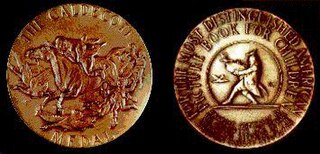
The Randolph Caldecott Medal, frequently shortened to just the Caldecott, annually recognizes the preceding year's "most distinguished American picture book for children". It is awarded to the illustrator by the Association for Library Service to Children (ALSC), a division of the American Library Association (ALA). The Caldecott and Newbery Medals are considered the most prestigious American children's book awards. Beside the Caldecott Medal, the committee awards a variable number of citations to runners-up they deem worthy, called the Caldecott Honor or Caldecott Honor Books.

The Hello, Goodbye Window is a children's picture book written by Norton Juster and illustrated by Chris Raschka. Published in 2005, the book tells the story of a little girl who enjoys visiting her grandparents. Raschka won the 2006 Caldecott Medal for his illustrations.

Chris Raschka is an American illustrator, writer, and violist. He contributed to children's literature as a children's illustrator. He was U.S. nominee for the biennial, international Hans Christian Andersen Medal in 2012.
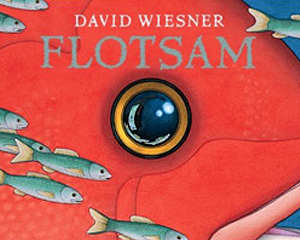
Flotsam is a children's wordless picture book written and illustrated by David Wiesner. Published by Clarion/Houghton Mifflin in 2006, it was the 2007 winner of the Caldecott Medal; the third win for David Wiesner. The book contains illustrations of underwater life with no text to accompany them.

A Ball for Daisy is a 2011 children's wordless picture book written and illustrated by Chris Raschka. The book tells the story of a dog named Daisy, who has a beloved ball destroyed and then replaced. Raschka won the 2012 Caldecott Medal for his illustrations in the book. The creation of the book took years but was praised for its ability to evoke emotion in the reader. A sequel, Daisy Gets Lost, was released in 2013.

Locomotive is a 2013 children's book written and illustrated by Brian Floca. A non-fiction book written primarily in free verse, the book follows a family as they ride a transcontinental steam engine train in summer of 1869. The book details the workers, passengers, landscape, and effects of building and operating the first transcontinental railroad. The book also contains prose about the earlier and later history of locomotives. The book took Floca four years to create, which included a change in perspective from following the crew of the train to following a family. Floca conducted extensive research including his own train ride and consultation with experts to ensure he had the details all correct.

This Is Not My Hat is a 2012 children's picture book by the author and illustrator Jon Klassen. The story is told through the unreliable narration of a little fish, who has stolen a hat from a big fish and how the big fish reacts to the theft. It is a thematic follow-up to I Want My Hat Back and was meant to be a more literal sequel until Klassen took a suggestion to change which animals were in the story. The book was well received by critics who praised its dark or ironic humor which could only be understood by comparing the words of the little fish's narration against the events of the illustrations. In addition to several positive reviews, Klassen won the 2013 Caldecott Medal and the 2014 Kate Greenaway Medal becoming the first book to win both awards. This is Not My Hat was also a commercial success.

Little Red Lies is a 2013 young adult novel by Canadian author Julie Johnston. The coming of age novel is set immediately after World War II in a small Canadian town.

Green is a children's picture book by American author and artist Laura Vaccaro Seeger. It was first published in 2012 by Roaring Brook Press. The pages illustrate different shades of green in nature, with cut-out shapes linking the different scenes.

Radiant Child: The Story of Young Artist Jean-Michel Basquiat is a 2016 picture book biography by Javaka Steptoe about Jean-Michel Basquiat. Using a style similar to Basquiat's, the book tells the story of his childhood and early career. It won the 2017 Caldecott Medal and Coretta Scott King Illustrator Award for its illustrations.

Wolf in the Snow is a 2017 wordless picture book by Matthew Cordell. The book was favorably received by critics and won the 2018 Caldecott Award. The story has drawn comparisons to fairy tales like Little Red Riding Hood. The nearly wordless book tells the story of a girl and wolf who each get lost in the snowstorm. Cordell used distinctive illustration techniques for the girl and the wolf.

Big Cat, Little Cat is a 2017 children's picture book written by Elisha Cooper. It was published by Roaring Brook Press, a subsidiary of Macmillan Books. In the story, a large, white cat welcomes a new black cat into a family. The white cat then dies, and the cycle begins anew when the family adopts a new kitten. Cooper was inspired to write the story after his family experienced a similar situation. Critics praised his illustrations, for their ability to help further the story's messages and themes. These monochromatic illustrations were different than the style Cooper normally employed when illustrating a book. The book was well-reviewed, and received a 2018 Caldecott Honor.
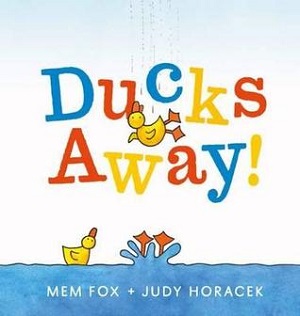
Ducks Away! is a 2016 children's picture book written by Mem Fox and illustrated by Judy Horacek. Published by Scholastic Inc., It is about a mother duck and her five ducklings attempting to cross a bridge, one by one, and fall off the bridge into the river below. The duck becomes more and more agitated until she, with the last of her ducklings dropping into the water and their encouragement, decides to follow them.

Crown: An Ode to the Fresh Cut is a 2017 picture book by Derrick Barnes, illustrated by Gordon C. James. The book, Barnes' first picture book, is a poem describing a boy's feelings and experience while getting a haircut. James, who was not the first choice to be the illustrator, wanted the oil color illustrations to have the feel of fine art.
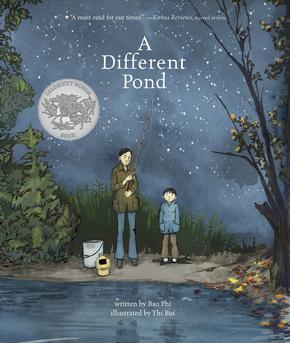
A Different Pond is a 2017 children's picture book by Bao Phi, illustrated by Thi Bui. The book tells the story of a boy and his father going fishing. Phi created the book because of his desire to have books about people like himself to read to his daughter. Bui's detailed illustrations allowed Phi to remove elements of the prose. Bui, who had never illustrated a traditional picture book before, won praise for her use of colors and was recognized with a 2018 Caldecott Honor. The book received positive reviews and appeared on best of 2017 book lists.
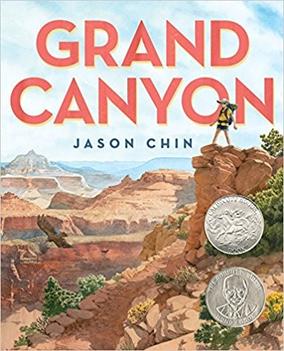
Grand Canyon by Jason Chin is a 2017 children's picture book. The book tells about the plants, animals and habitats of the Grand Canyon, both now and in the past, using the premise of a hiking trip there. The inspiration for the book was a trip in high school; Chin had originally conceived of a Grand Canyon origin story. The book marked the first time Chin used die cuts, in addition to his normal use of pen and ink, watercolors, and gouache. The book was awarded a 2018 Caldecott Honor for its illustrations and a 2018 Sibert Honor for its informative text. Grand Canyon is one of only a few non-fiction books that are not biographies to be recognized by the Caldecott.

Hello Lighthouse is a picture book written and illustrated by Sophie Blackall. The book tells the story of a lighthouse and its last keeper and was well received, winning the 2019 Caldecott Medal for its illustrations. Drawing inspiration from a variety of sources, Blackall worked hard on the design of the book. The writing and illustrations were meant to complement each other noting the change and consistency of the sea.
Squirrel's New Year's Resolution is a 2010 Children's picture book written by Pat Miller and illustrated by Kathi Ember. It is about Squirrel who wants to make a New Year's resolution but initially doesn't know what it is, then helps her friends with theirs but is unable to think of one for herself. Finally, Rabbit tells her that she actually resolved to help someone every day.
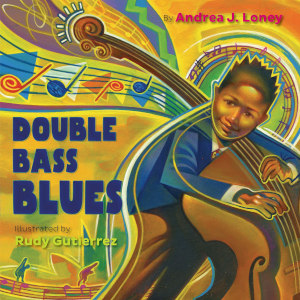
Double Bass Blues is a 2019 picture book by Andrea J. Loney and illustrated by Rudy Gutierrez. The book was generally well-reviewed, and it received a 2020 Caldecott Honor.
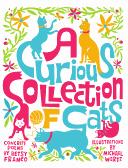
A Curious Collection of Cats: Concrete Poems is a 2009 Children's poetry collection by Betsy Franco and illustrated by Michael Wertz. It is made up of concrete poems in various forms, including haiku, limerick, and free verse, that highlight various aspects of cat behaviour.



















